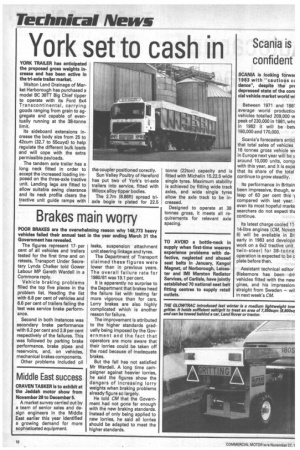Brakes main worry
Page 12

If you've noticed an error in this article please click here to report it so we can fix it.
POOR BRAKES are the overwhelming reason why 148,773 heavy vehicles failed their annual test in the year ending March 31 the Government has revealed.
The figures represent 17per cent of all vehicles and trailers tested for the first time and on retests, Transport Under Secretary Lynda Chalker told Gower Labour MP Gareth Wardell in a Commons reply.
Vehicle braking problems filled the top five places in the problem list. Heading the list with 6.8 per cent of vehicles and 6.6 per cent of trailers failing the test was service brake performance.
Second in both instances was secondary brake performance with 6.2 per cent and 2.8 per cent respectively of the failures. This was followed by parking brake performance, brake pipes and reservoirs, and, on vehicles, mechanical brakes components.
Other problems included oil leaks, suspension attachment unit steering linkage and tyres.
The Department of Transport claimed these figures were lower than in previous years. The overall failure rate for 1980/81 was 19.1 per cent.
It is apparently no surprise to the Department that brakes head the failure list with testing far more vigorous than for cars. Lorry brakes are also highly complicated which is another reason for failure.
The improvement is attributed to the higher standards gradually being imposed by the Govern ment and the fact that operators are more aware that their lorries could be taken off the road because of inadequate brakes.
But the fall has not satisfied Mr Wardell. A long time campaigner against heavier lorries, he said the figures show the dangers of increasing lorry weights when braking problems already figure so largely.
He told CM that the Government had not gone far enough with the new braking standards. Instead of only being applied to new lorries, he said all lorries should be adapted to meet the higher standards.


















































